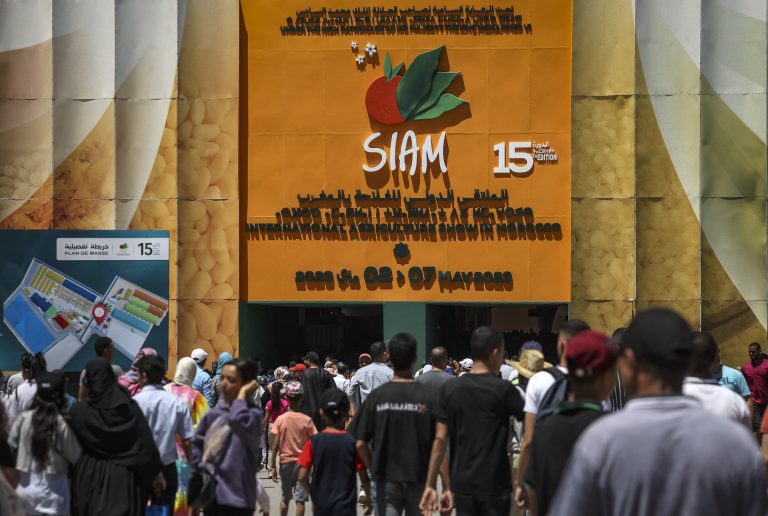São Paulo – The Ministries of Agriculture and Livestock and Foreign Affairs of Brazil will have a stand at the 16th edition of the International Agricultural Exhibition in Morocco (SIAM) to present the public of the trade show with Brazil’s expertise in agribusiness. The event is also an opportunity to scope out business as it is one of the industry’s largest in Africa and in 2023 hosted 923,000 visitors and 1,400 exhibitors from 70 countries. The trade show will be held in the city of Meknes, northern Morocco. (Pictured, people visit last year’s edition of the fair.)
Ellen Elizabeth Laurindo, agricultural attaché of Brazil in Rabat, told ANBA that joining the show again will be a “unique opportunity to present the power of the Brazilian agriculture and promote and maintain the image of Brazil as a reliable trade partner.”
Morocco was the fourth leading destination of Brazilian exports in Africa, totaling USD 1.23 billion in 2023, when trade flow between the two countries added up to USD 2.65 billion. The five top products exported from Brazil to Morocco – raw sugar, corn kernel, black pepper, raw soy oil, and frozen beef – accounted in 2023 for over 90% of overall exports to the Arab country. Live cattle, unroasted coffee, and soybean grain were also highlights, the attaché said.
On the other hand, leading products imported by Brazil from Morocco in 2023 were compound fertilizers and phosphorus fertilizers at over USD 1 billion, followed by frozen sardines at USD 24.2 million.
Laurindo says there is room to broaden exports and stresses opportunities like pet food products, a market in Morocco that has recently opened to Brazil. “It’s a new market for Brazil with a huge potential of popularity in Morocco, as Brazilian petfood is high-quality and very competitive compared to European competitors,” says Laurindo. “Another key industry is irrigation machinery and technology, as Morocco has increasingly boosted its agriculture, and water scarcity is a major challenge,” she says.
She says that Brazil is talking with Morocco to open more markets like dairy products, natural beef casings, honey and honey products, leather, and bovine genetic material, and she points out that relevant markets have been opened already. That is the case with beef and beef products, live cattle, vegetable products, fisheries, and others. Nevertheless, there are still challenges. The country charges import tariffs of 200% on frozen beef and 100% on raw poultry.
Laurindo points out that Morocco offers various opportunities to Brazilian companies within its own market and to reach other countries. It is a strategically located country that is close to Europe and within Africa. It has opened its economy since the 1990s, has free trade agreements with over 50 countries and blocs, including the European Union, and has a “state-of-the-art logistics infrastructure,” Laurindo says.
A trade delegation to Morocco to take place on the sidelines of SIAM is being organized by Brazil’s agriculture ministry, the Arab-Brazilian Chamber of Commerce (ABCC) and Brazilian Trade and Investment Promotion Agency (ApexBrasil). The mission will take place from April 22 to 25 and feature a visit to SIAM, technical visits to farms in the surrounding area of Meknes, a Brazil-Morocco seminar in Casablanca, where participants will also attend networking events with local companies and participate in visit to a supermarket, and a technical visit to the Port of Tanger.
The Brazilian stand at SIAM will be at the trade show’s international hub and prioritize booths for Brazilian firms participating in the trade mission. Registration for the mission is open at this link.
Translated by Guilherme Miranda




